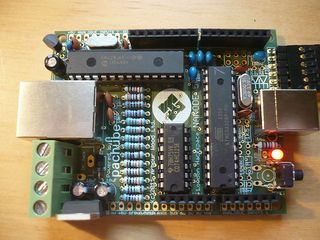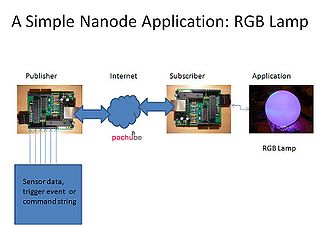Difference between revisions of "Discover Nanode"
m |
Samthetechie (talk | contribs) m (→Nanode Documentation: fixing broken link) |
||
| Line 47: | Line 47: | ||
===Nanode Documentation=== | ===Nanode Documentation=== | ||
| − | All circuit diagrams, board files, details of connectors, partslists can be accessed from the [ | + | All circuit diagrams, board files, details of connectors, partslists can be accessed from the [[Project:Nanode/docs Documentation Page]] |
===Nanode Applications=== | ===Nanode Applications=== | ||
Latest revision as of 10:36, 27 February 2016
Nanode - An Introduction
Nanode is a low cost, web connected, physical computing platform based on the same technology as Arduino.
Nanode - a 30 second pitch
Nanode is an open source Arduino-like board that has in-built web connectivity. It connects to a range of wireless, wired and ethernet interfaces.
It allows you to develop web based sensor and control systems - giving you web access to six analogue sensor lines and six digital I/O lines.
It costs under £20 as an easy build it yourself kit. Nanode was designed with Hacking in mind.
Some Background
The Nanode is a low cost entry device aimed at network and Internet Connectivity projects.
Its name was originally derived from "Networked Arduino Node" as it essentially opens up the possibility of networking Arduino-like devices both to the internet, and locally using a mix of wired and wireless networks.
It has been conceived as an experimental platform, an enabling technology, which will allow applications to be developed at minimum cost and hassle.
It combines the functionality of the Arduino and an ethernet shield onto the one small board. This literally halves the cost of a net connected Arduino platform.
It has been designed with low cost hacking in mind and can be built easily for under £20 - so that it will appeal to those on a tight budget.
It uses the popular Arduino environment so will be familiar to many. It also accepts Arduino shields, and a wireless shield based on the popular RFM12 device is planned. This will open up the Nanode to wireless networking and creating bridges between wireless, and wired networks and the Internet.
Nanode consists of a small PCB which has the ATmega328 microcontroller, some glue logic, the ENC28J60 ethernet controller and a Magjack ethernet connector. The board only uses through-hole and DIL conventional components - so that it can be easily assembled by anyone who has basic soldering skills.
It makes an ideal project for a teaching workshop on web connectivity, and as such will appeal to Hackspaces for advanced Arduino workshops.
Nanode Hardware
The Hardware details are included on a separate Hardware page
Nanode Software
Nanode Documentation
All circuit diagrams, board files, details of connectors, partslists can be accessed from the Project:Nanode/docs Documentation Page
Nanode Applications
Nanode can be used for a wide variety of web connected applications, such as remote monitoring and control, or as a simple web server. It can also connect to open data services such as Pachube.
See the Nanode Applications page for details
Nanode Blogs
A list of what others are writing about Nanode
Vic at Wicked Device describes a Pachube connection
Maniacbug also has his Nanode sending data to a Pachube Feed
Andrew Lindsay controls an RGB lamp using a Nanode getting data from a Pachube Feed
JeeLabs Ethercard API which runs on Nanode - as used in Maniacbug's example above
Nanode Events
Nanode will be presented at Brighton Mini Maker Faire on Saturday 3rd September.
Nanode at Open Hardware Summit - New York City, 15th September 2011.
Nanode joins Wicked Device at New York City Maker Faire 17th/18th September.
Nanode Roadshow - Birmingham and Nottingham Hackspaces in 1 Weekend
Nanode 1 day Workshop at FizzPop, Birmingham - September - Date to be Confirmed
Nanode 1 day Workshop at NotttingHack, Nottingham - September - Date to be Confirmed
Nanode Workshop as part of Internet of Things Open Hardware Camp - Centre for Creative Collaborations, Thursday 27th October.
Nanode attends Homecamp4 "Hack the House" - Centre for Creative Collaborations, Sat/Sun 29th/30th OctoberOctober.

